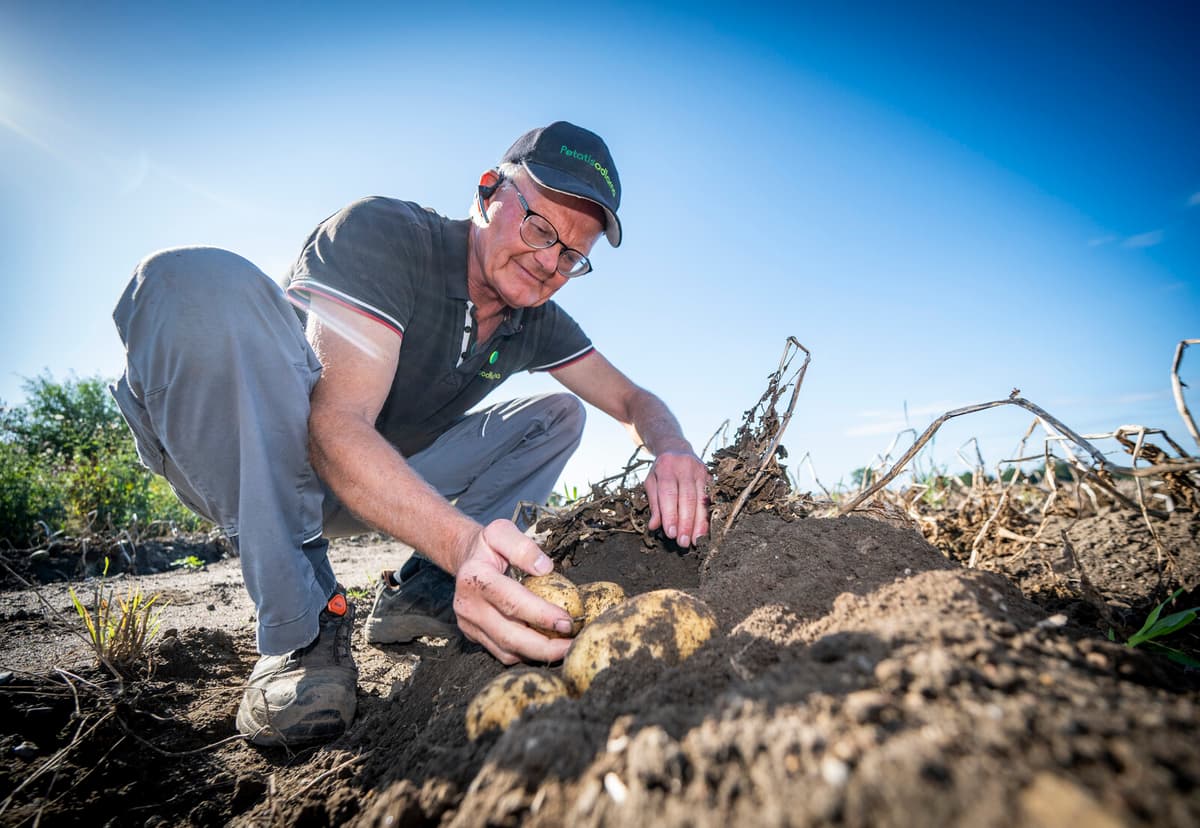The PFAS found in plant protection products forms TFA, a water-soluble, toxic substance that seeps into the groundwater. Therefore, Denmark will phase out around 20 plant protection products with the eternal chemical PFAS in a short time. Now, Anders Andersson and many with him are waiting for the Swedish strategy. Will it be like in Denmark?
- There are nice varieties that do not need as much pesticides, absolutely, but they have a number of drawbacks and I do not think that trade and consumers are prepared for it, says Anders Andersson, farmer at Hörtegården in southern Skåne.
In that case, consumers must accept uglier potatoes, he means. And that's how he explains his choice to grow potato varieties that are sensitive to blight.
- Consumers only buy the ones that are fine. 15-20 percent of potatoes are discarded due to appearance and become biogas and animal feed.
Cunning blight fungus
Resistant blight fungus is the potato growers' great fear.
The blight fungus is so cunning, so it has gotten around many substances and become resistant, says Anders Andersson.
Therefore, it is important not to use the same substance all the time - and the alternatives without PFAS are few.
It's a choice between the plague or cholera, says Anders Andersson.
Several growers who TT has spoken to also point out the risk of resistant blight fungus, and so does the industry organization Potato Growers and the agricultural organization LRF. But a larger conventional grower, who does not want to participate with a name, says that he has found a solution and now manages completely without PFAS agents in his cultivation.
"Sitting on needles"
We are all sitting on needles, says Charlott Gissén, environmental coordinator at the Swedish Board of Agriculture, ahead of the PFAS strategy that the Chemicals Inspection will present in the autumn.
That it is possible to grow potatoes without PFAS is proven by organic farming, she believes. But how the harvest result is affected, she cannot comment on.
Choice of variety and preventive measures such as proper crop rotation and cultivation technique will be crucial.
We will find ways, but what they look like and how extensive the problem becomes, I do not know.
PFAS agents are used widely in conventional farming, not only against potato blight but also against weeds and insects that can damage the crops.
Toxic metabolite
German authorities believe that TFA, which is formed when PFAS molecules break down, can harm both fetuses and reproductive capacity. Now, a re-evaluation is underway throughout the EU.
That's the problem, that TFA has emerged as a potentially toxic metabolite that was not previously noticed, says Mats Allmyr, administrator at the Chemicals Inspection.
The European Food Safety Authority (EFSA) is looking at how toxic TFA is and is expected to come up with a message next year about how much a person can ingest without it having negative health effects. But regardless of that message, pesticides must not contaminate groundwater, and that's what they've taken note of in Denmark.
In Sweden, the issue has been investigated during the spring and Mats Allmyr promises a message about the Swedish strategy "in the near future".
Major consequences
It concerns many products and it can have major consequences for Swedish agriculture if you address all at once. For the authority, it is also a resource issue to handle the re-examination of a large number of products, so we must come up with a strategy and plan for how this will be done, he says.
Potato grower Fredrik Andersson, who sits on LRF's board, believes that a PFAS decision like the one in Denmark would have far-reaching consequences for Swedish agriculture.
It must be handled so that we do not knock out domestic production and get imports instead, because then it will only get worse.
PFAS are chemicals created by humans and break down very slowly.
They are called eternal chemicals and accumulate in nature and in our bodies.
PFAS are used, for example, in refrigerants, impregnating agents, fire extinguishing foam, makeup, packaging, and also in plant protection products used in agriculture.
PFAS in plant protection products have been noted for being able to break down into TFA (trifluoroacetic acid).
TFA is water-soluble, extremely difficult to break down, and can end up in groundwater.
TFA is suspected to be reproductively toxic.
The TFA found in groundwater does not only come from plant protection products, but from all PFAS used. It spreads through the air and rains down.
Source: Chemicals Inspection






